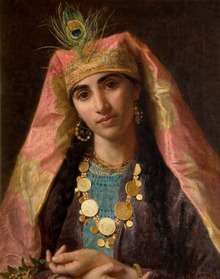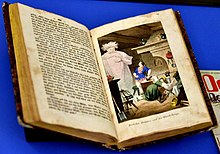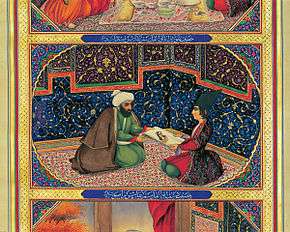Scheherazade
Scheherazade (/ʃəˌhɛrəˈzɑːd, -də/[1]) is a major female character and the storyteller in the frame narrative of the Middle Eastern collection of tales known as the One Thousand and One Nights.
| Scheherazade شهرزاد | |
|---|---|
| One Thousand and One Nights character | |
 Scheherazade, painted in the 19th century by Sophie Anderson | |
| Portrayed by | Mili Avital, Catherine Zeta-Jones, Claude Jade, Anna Karina, María Montez, Cyrine Abdelnour, Sulaf Fawakherji, Annette Haven |
| In-universe information | |
| Gender | Female |
| Occupation | Queen consort |
| Family | The chief vizier (father) Dunyazad (sister) |
| Spouse | Shahryar |
| Children | 3 sons |
| Other names | Shahrazad, Shahrzad |
Name

According to modern scholarship, the name "Scheherazade" derives from an Arabic form of the Middle Persian name Čehrāzād, which is composed of the words čehr (lineage) and āzād (noble, exalted).[2][3][4] The earliest forms of Scheherazade's name in Arabic sources include Shirazad (شيرازاد, Šīrāzād) in Masudi, and Shahrazad in Ibn al-Nadim.[5][6]
The name appears as Šahrazād in the Encyclopedia of Islam[4] and as Šahrāzād in Encyclopædia Iranica.[3] Among standard 19th-century printed editions, the name appears as شهرزاد (Šahrazād) in Macnaghten's Calcutta edition (1839-1842)[7] and in the 1862 Bulaq edition,[8] and as شاهرزاد (Šāhrazād) in the Breslau edition (1825-1843).[9] Muhsin Mahdi's critical edition has شهرازاد (Šahrāzād).[10]
The spelling "Scheherazade" first appeared in English-language texts in 1801, borrowed from German usage.[1]
Narration

The story goes that the monarch Shahryar found out one day that his first wife was unfaithful to him. He thus resolved to marry a new virgin each day as well as behead the previous day's wife, so that she would not have the opportunity to be unfaithful to him. He had killed 1,001 such women by the time he was introduced to Scheherazade, the vizier's daughter.
In Sir Richard Burton's translation of The Nights, Scheherazade was described in this way:
Scheherazade had perused the books, annals, and legends of preceding Kings, and the stories, examples, and instances of bygone men and things; indeed it was said that she had collected a thousand books of histories relating to antique races and departed rulers. She had perused the works of the poets and knew them by heart; she had studied philosophy and the sciences, arts, and accomplishments; and she was pleasant and polite, wise and witty, well read and well bred.
Against her father's wishes, Scheherazade volunteered to spend one night with the king. Once in the king's chambers, Scheherazade asked if she might bid one last farewell to her beloved sister, Dunyazad, who had secretly been prepared to ask Scheherazade to tell a story during the long night. The king lay awake and listened with awe as Scheherazade told her first story. The night passed by and Scheherazade stopped in the middle. The king asked her to finish, but Scheherazade said there was no time, as dawn was breaking. So, the king spared her life for one day to finish the story the next night. The following night, Scheherazade finished the story and then began a second, more exciting tale, which she again stopped halfway through at dawn. Again, the king spared her life for one more day so she could finish the second story.
And so the king kept Scheherazade alive day by day, as he eagerly anticipated the finishing of the previous night's story. At the end of 1,001 nights, and 1,000 stories, Scheherazade told the king that she had no more tales to tell him. During these 1,001 nights, the king had fallen in love with Scheherazade. He spared her life and made her his queen.
See also
- Scheherazade in popular culture
References
- "Scheherazade". Merriam-Webster. Retrieved Apr 27, 2019.
- Marzolph, Ulrich (2017). "Arabian Nights". In Kate Fleet; Gudrun Krämer; Denis Matringe; John Nawas; Everett Rowson (eds.). Encyclopaedia of Islam (3rd ed.). Brill. doi:10.1163/1573-3912_ei3_COM_0021.
the narrator's name is of Persian origin, the Arabicised form Shahrazād being the equivalent of the Persian Chehr-āzād, meaning “of noble descent and/or appearance.
- Ch. Pellat (2011). "ALF LAYLA WA LAYLA". Encyclopædia Iranica.
- Hamori, A. (2012). "S̲h̲ahrazād". In P. Bearman; Th. Bianquis; C.E. Bosworth; E. van Donzel; W.P. Heinrichs (eds.). Encyclopaedia of Islam (2nd ed.). Brill. doi:10.1163/1573-3912_islam_SIM_6771.
- Robert Irwin (2004). The Arabian Nights: A Companion. Tauris Parke Paperbacks (Kindle edition). p. 944 (Kindle loc).
- حمدان محمد علي حسين إسماعيل (2009). إشكالية الترجمة في الآدب المقارن. Al Manhal. p. 170. ISBN 9796500054087.
- William Hay Macnaghten, ed. (1839). The Alif laila. 1. Calcutta, W. Thacker and co. p. 14.
- Kitāb alf laylah wa-laylah. 1. Bulaq. 1862. p. 20.
- Maximilian Habicht; Heinrich Leberecht Fleischer, eds. (1825). Tausend und eine Nacht = alf laylah wa-laylah : arabisch, nach einer Handschrift aus Tunis. 1. Breslau. p. 31.
- Muhsin Mahdi, ed. (1984). Alf Layla wa-Layla. Brill. p. 66. ISBN 978-9004074316.
External links
| Wikiquote has quotations related to: Scheherazade |
| Wikimedia Commons has media related to Scheherazade. |